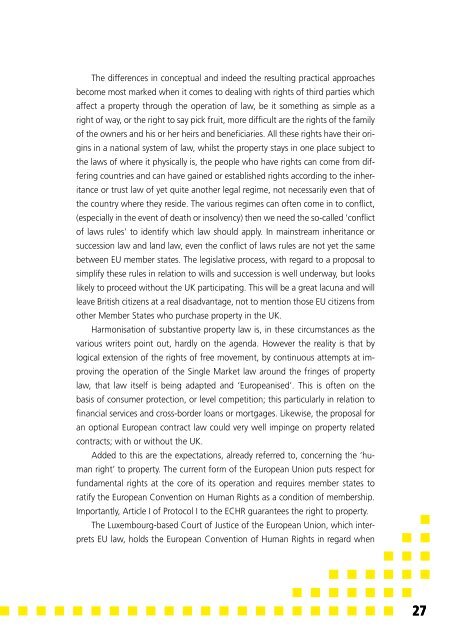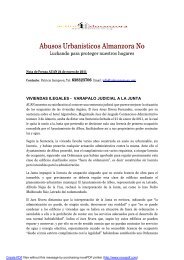European Property Rights and Wrongs - Diana Wallis MEP
European Property Rights and Wrongs - Diana Wallis MEP
European Property Rights and Wrongs - Diana Wallis MEP
You also want an ePaper? Increase the reach of your titles
YUMPU automatically turns print PDFs into web optimized ePapers that Google loves.
The differences in conceptual <strong>and</strong> indeed the resulting practical approaches<br />
become most marked when it comes to dealing with rights of third parties which<br />
affect a property through the operation of law, be it something as simple as a<br />
right of way, or the right to say pick fruit, more difficult are the rights of the family<br />
of the owners <strong>and</strong> his or her heirs <strong>and</strong> beneficiaries. All these rights have their origins<br />
in a national system of law, whilst the property stays in one place subject to<br />
the laws of where it physically is, the people who have rights can come from differing<br />
countries <strong>and</strong> can have gained or established rights according to the inheritance<br />
or trust law of yet quite another legal regime, not necessarily even that of<br />
the country where they reside. The various regimes can often come in to conflict,<br />
(especially in the event of death or insolvency) then we need the so-called ‘conflict<br />
of laws rules’ to identify which law should apply. In mainstream inheritance or<br />
succession law <strong>and</strong> l<strong>and</strong> law, even the conflict of laws rules are not yet the same<br />
between EU member states. The legislative process, with regard to a proposal to<br />
simplify these rules in relation to wills <strong>and</strong> succession is well underway, but looks<br />
likely to proceed without the UK participating. This will be a great lacuna <strong>and</strong> will<br />
leave British citizens at a real disadvantage, not to mention those EU citizens from<br />
other Member States who purchase property in the UK.<br />
Harmonisation of substantive property law is, in these circumstances as the<br />
various writers point out, hardly on the agenda. However the reality is that by<br />
logical extension of the rights of free movement, by continuous attempts at improving<br />
the operation of the Single Market law around the fringes of property<br />
law, that law itself is being adapted <strong>and</strong> ‘<strong>European</strong>ised’. This is often on the<br />
basis of consumer protection, or level competition; this particularly in relation to<br />
financial services <strong>and</strong> cross-border loans or mortgages. Likewise, the proposal for<br />
an optional <strong>European</strong> contract law could very well impinge on property related<br />
contracts; with or without the UK.<br />
Added to this are the expectations, already referred to, concerning the ‘human<br />
right’ to property. The current form of the <strong>European</strong> Union puts respect for<br />
fundamental rights at the core of its operation <strong>and</strong> requires member states to<br />
ratify the <strong>European</strong> Convention on Human <strong>Rights</strong> as a condition of membership.<br />
Importantly, Article I of Protocol I to the ECHR guarantees the right to property.<br />
The Luxembourg-based Court of Justice of the <strong>European</strong> Union, which interprets<br />
EU law, holds the <strong>European</strong> Convention of Human <strong>Rights</strong> in regard when<br />
27



